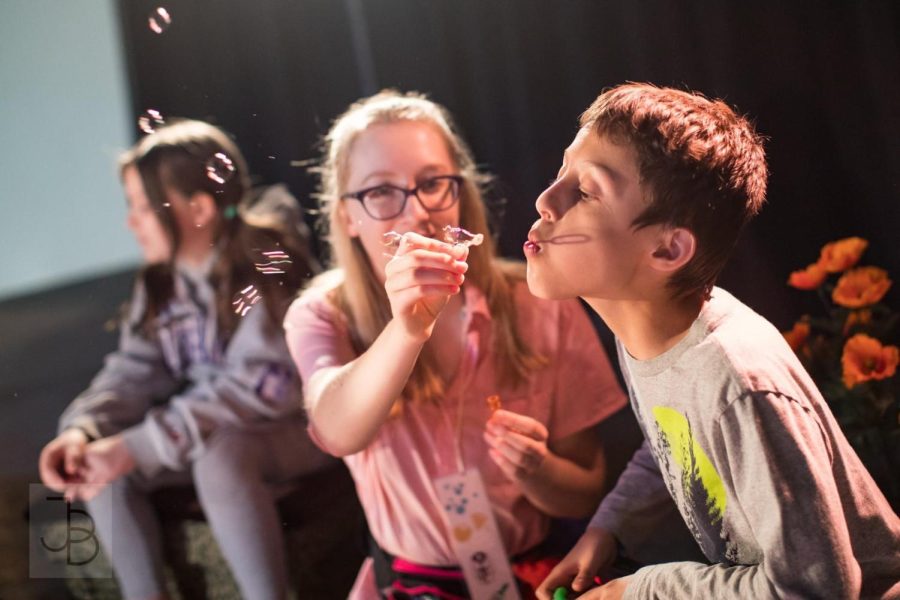Seesaw Theatre produces theatre designed for the audience
Photo courtesy of Justin Barbin Photography
Northwestern students interact with audience members during a Seesaw Theatre production.
October 18, 2021
When Communication senior Ilana Abusch served as an adventure guide in Seesaw Theatre’s spring show her freshman year, she was paired up with a little boy who did not like to be touched. Abusch kept her distance at first, but she said the boy gave her a hug after entering the theater space, and they ended up lying down together to look at the decorations on the ceiling.
“At the end of the show, when it was time for him to leave, the teacher came up to me sobbing and hugged me. It was like, he never does that,” said Abusch, who now serves as Seesaw Theatre’s artistic director. “An environment where kids feel completely at ease is the magic that I’ve seen with our in-person work.”
Founded in 2012, Seesaw Theatre at Northwestern creates multi-sensory, immersive theatre experiences for children with autism or other disabilities in the Chicago area. Typically, Seesaw Theatre holds its annual Inclusive Theatre Festival in Fall Quarter and creates performances in Winter and Spring Quarters.
“What we prioritize most above all else is agency for our audience members and giving them an hour of experience that they truly want,” Abusch said.
Abusch said Seesaw Theatre has not held any in-person performances since March 2020 because many of its audience members are immunocompromised. But virtual events have come with some silver linings, she said.
Last winter and spring, Seesaw Theatre sent out over 450 prop boxes to their audience members, so the children could engage the props while they watched video components of the virtual performances. Children could keep the props, too.
Seesaw Theatre reached more audience members with the virtual format — about five times as many as they did the winter before the pandemic, Abusch said.
Executive Director Julia Hogan Laurenson said Seesaw Theatre performances are “the most extreme form of improv.”
“We’ll create a whole show and be so ready to share it, but then our audience members will come into the space. And if they decide that they want to do something that’s completely unrelated to the show, we are so ready to do that,” the Communication senior said.
Seesaw Theatre’s Sixth Annual Inclusive Theatre Festival will happen virtually Nov. 20 to 21 and will include presenters from different backgrounds and fields. For example, one presenter this year works in occupational therapy and researches the effects of theatre for disabled people.
The Inclusive Theatre Festival connects people throughout the industry from different parts of the world, according to Molly McDermott, Seesaw Theatre’s Conference and Engagement Director and a Communication junior.
“That’s more of a celebration of accessibility and inclusion in the arts with other professionals, other educators,” McDermott said. “(The festival is) less geared towards the children that we’re working with, but definitely families of the children that we’re working with.”
The festival will feature eight presentations this year, including one from Seesaw Theatre, McDermott said. Some presenters will do a performance, while others will do a more traditional presentation.
Abusch said theatre can be a very selfish industry — actors often focus only on themselves and see themselves as the stars. But Seesaw Theatre is different, she said.
“What I really love about Seesaw is it’s wholly unselfish. It is only for the audience members. It just reminds you over and over again that it’s not about you, but you have the opportunity and the pleasure to make it for someone else,” Abusch said.
Email: [email protected]
Twitter: @RaynaYu_Song
Related Stories:
— Inspired by her brother, Julia Hogan Laurenson and Seesaw discuss inclusivity in theater
— “I’m never myself”: Northwestern theatre major navigates campus life, remote learning and autism












